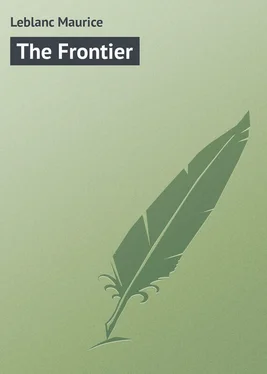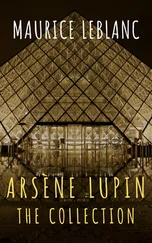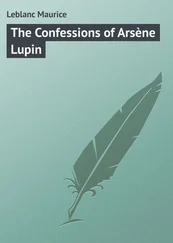Maurice Leblanc - The Frontier
Здесь есть возможность читать онлайн «Maurice Leblanc - The Frontier» — ознакомительный отрывок электронной книги совершенно бесплатно, а после прочтения отрывка купить полную версию. В некоторых случаях можно слушать аудио, скачать через торрент в формате fb2 и присутствует краткое содержание. Жанр: Классический детектив, foreign_detective, foreign_prose, на английском языке. Описание произведения, (предисловие) а так же отзывы посетителей доступны на портале библиотеки ЛибКат.
- Название:The Frontier
- Автор:
- Жанр:
- Год:неизвестен
- ISBN:нет данных
- Рейтинг книги:4 / 5. Голосов: 1
-
Избранное:Добавить в избранное
- Отзывы:
-
Ваша оценка:
- 80
- 1
- 2
- 3
- 4
- 5
The Frontier: краткое содержание, описание и аннотация
Предлагаем к чтению аннотацию, описание, краткое содержание или предисловие (зависит от того, что написал сам автор книги «The Frontier»). Если вы не нашли необходимую информацию о книге — напишите в комментариях, мы постараемся отыскать её.
The Frontier — читать онлайн ознакомительный отрывок
Ниже представлен текст книги, разбитый по страницам. Система сохранения места последней прочитанной страницы, позволяет с удобством читать онлайн бесплатно книгу «The Frontier», без необходимости каждый раз заново искать на чём Вы остановились. Поставьте закладку, и сможете в любой момент перейти на страницу, на которой закончили чтение.
Интервал:
Закладка:
"I wrote to the prefect last week."
"You should have written last year! All this time, the other has been coming on, the other has been advancing… He hardly takes the trouble to conceal himself… There … listen to him … listen to him…"
In the far distance, like the sound of an echo, deadened by the mass of trees, a bugle-call had rung out, somewhere, through the air. It was an indistinct call, but Morestal was not mistaken and he hissed:
"Ah, it's he!.. It's he… I know the voice of Germany… I know it when I hear it … the hoarse, the odious voice!.."
Presently, Philippe, who had not taken his eyes off his father, said:
"And then, father?"
"And then, my son, it was in anticipation of that day that I built my house on this hill, that I surrounded my gardens with a wall, that, unknown to anybody, I stocked the out-houses with means of defence: ammunition, bags of sand, gun-powder … that, in short, I prepared for an alarm by setting up this unsuspected little fortress at twenty minutes from the Col du Diable … on the very threshold of the frontier!"
He had planted himself with his face to the east, with his face to the enemy; and, clutching his hips with his clenched hands, in an attitude of defiance, he seemed to be awaiting the inevitable assault.
The special commissary, who still feared that his zeal had been caught napping in this business, growled:
"Your shanty won't hold out for an hour."
"And who tells you," shouted Morestal, "who tells you that that hour is not exactly the one hour which we shall want to gain?.. An hour! You never spoke a truer word: an hour of resistance to the first attack! An hour of delay!.. That's what I wanted, that's what I offer to my country. Let every one be doing as I am, to the best of his power, let every one be haunted to fever-point by the obsession of the personal service which it is his duty to render to the country; and, if war breaks out, you shall see how a great nation can take its revenge!"
"And suppose we are beaten, in spite of all?" Philippe asked again.
"What's that?"
Old Morestal turned to his son as though he had received a blow; and a rush of blood inflamed his features. He looked Philippe in the face:
"What do you say?"
Philippe had an inkling of the conflict that would hurl them one against the other if he dared to state his objections more minutely. And he uttered words at random:
"Of course, the supposition is not one of those which we can entertain… But, all the same … don't you think we ought to face the possibility?.."
"Face the possibility of defeat?" echoed the old man, who seemed thunderstruck. "Are you suggesting that the fear of that ought to influence France in her conduct?"
A diversion relieved Philippe of his difficulty. Some one had appeared from the staircase at the end of the terrace and in so noisy a fashion that Morestal did not wait for his son to reply:
"Is that you, Saboureux? What a row you're making!"
It was Farmer Saboureux, whose house could be seen on the Col du Diable. He was accompanied by an old, ragged tramp.
Saboureux had come to complain. Some soldiers taking part in the manœuvres had helped themselves to two of his chickens and a duck. He seemed beside himself, furious at the catastrophe:
"Only, I've a witness in old Poussière here. And I want an indemnity, not to speak of damages and punishment. I call it a calamity, I do: soldiers of our own country!.. I'm a good Frenchman, but, all the same …"
Morestal was too much absorbed in the discussion of his favourite ideas to take the least interest in the man's troubles; and the farmer's presence, on the contrary, seemed to him an excellent reason for returning to the subject in hand. They had other things to talk about than chickens and ducks! What about the chances of war? And the alarming rumours that were current?
"What do you say, Saboureux?"
The farmer presented the typical appearance of those peasants whom we sometimes find in the eastern provinces and who, with their stern, clean-shaven faces, like the faces on ancient medals, remind us of our Roman ancestors rather than of the Gauls or Francs. He had marched to battle in 1870 with the others, perishing with hunger and wretchedness, risking his skin. And, on his return, he had found his shanty reduced to ashes. Some passing Uhlans… Since that time, he had laboured hard to repair the harm done.
"And you want it all over again?" he said. "More Uhlans burning and sacking?.. Oh, no, I've had enough of that game! You just let me be as I am!"
He was filled with the small land-owner's hatred against all those, Frenchmen or others, who were likely to tread with a sacrilegious foot on the sown earth, where the harvest is so slow in coming. He crossed his arms, with a serious air.
"And you, Poussière, what would you say if we went to war?" asked Morestal, calling to the old tramp, who was sitting on the parapet of the terrace, breaking a crust.
The man was lean and wizened, twisted like a vine-shoot, with long, dust-coloured hair and a melancholy, impassive face that seemed carved out of old oak. He put in an appearance at Saint-Élophe once every three or four months. He knocked at the doors of the houses and then went off again.
"What country do you belong to, to begin with?"
He grunted:
"Don't know much about it … it's so long ago…"
"Which do you like best? France, eh? The roads on this side?"
The old chap swung his legs without answering, perhaps without understanding. Saboureux grinned:
"He doesn't look at the roads, not he! He doesn't as much as know if he belongs to the country on the right or on the left! His country lies where the grub lies … eh, Poussière?"
Thereupon, seized with sudden ill-humour, Morestal lost his temper and let fly at the lukewarm, at the indifferent – working-men, townsmen or farmers – who think only of their comfort, without caring whether the country is humiliated or victorious. But what else could one expect, with the detestable ideas spread by some of the newspapers and carried to the furthermost ends of the country in the books and pamphlets hawked about by travelling agents?
"Yes," he cried, "the new ideas: those are the evil that is destroying us. The school-masters are poisoning the minds of the young. The very army is smitten with the canker. Whole regiments are on the verge of mutiny…"
He turned a questioning glance upon Philippe, who, from time to time, nodded his head without replying, with a movement which his father might take for one of approval.
"Isn't it so, Philippe? You see the thing close at hand, where you are: all those poltroons who weaken our energies with their fine dreams of peace at any price! You hear them, all the wind-bags at the public meetings, who preach their loathsome crusade against the army and the country with open doors and are backed up by our rulers… And that's only speaking of the capital!.. Why, the very provinces haven't escaped the contagion!.. Here, have you read this abomination?"
He took a little volume in a violet wrapper from among the papers heaped up on his table and held it before his son's eyes. And he continued:
" Peace before All! No author's name. A book that's all the more dangerous because it's very well written, not by one of those wind-bags to whom I was referring just now, but by a scholar, a provincial and, what's more, a Frenchman from the frontier. He seems even to bear our name … some distant cousin, no doubt: the Morestals are a large family."
"Are you sure?" blurted Philippe, who had turned pale at the sight of the pamphlet. "How do you know?"
"Oh, by accident… A letter which was addressed to me and which said, 'All good wishes for the success of your pamphlet, my dear Morestal.'"
Читать дальшеИнтервал:
Закладка:
Похожие книги на «The Frontier»
Представляем Вашему вниманию похожие книги на «The Frontier» списком для выбора. Мы отобрали схожую по названию и смыслу литературу в надежде предоставить читателям больше вариантов отыскать новые, интересные, ещё непрочитанные произведения.
Обсуждение, отзывы о книге «The Frontier» и просто собственные мнения читателей. Оставьте ваши комментарии, напишите, что Вы думаете о произведении, его смысле или главных героях. Укажите что конкретно понравилось, а что нет, и почему Вы так считаете.












